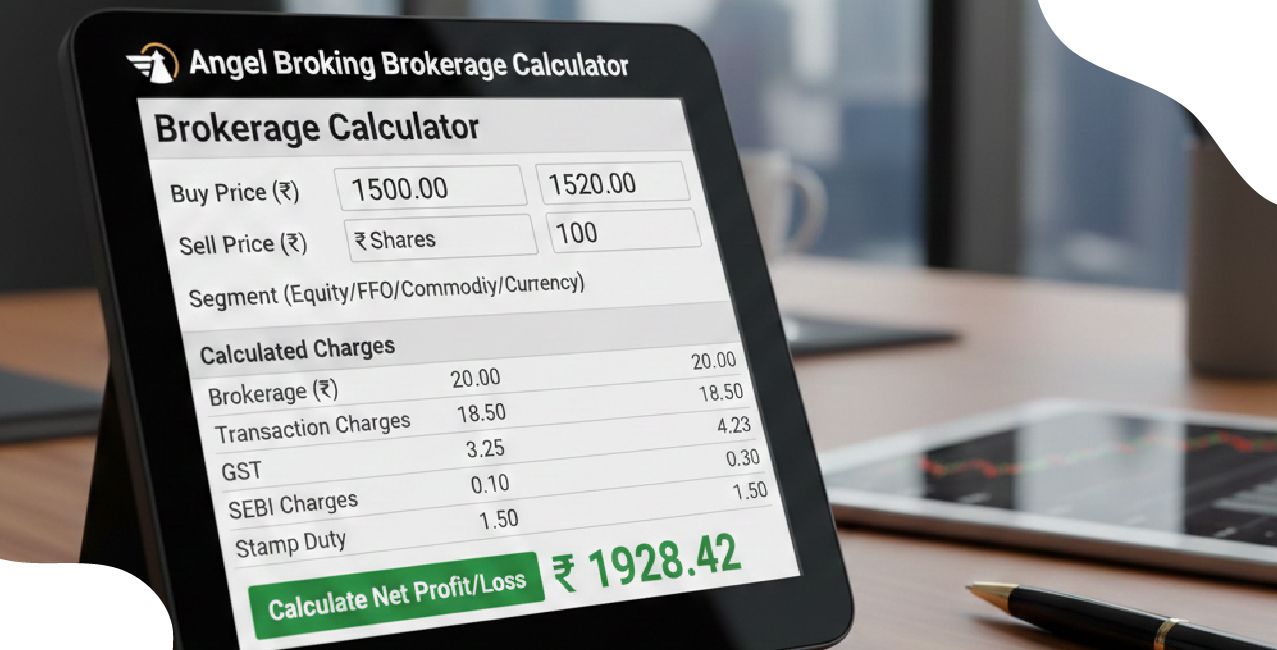How to Invest in the Share Market? All You Need to Know

Check Your Loan Eligibility Now
By continuing, you agree to LoansJagat's Credit Report Terms of Use, Terms and Conditions, Privacy Policy, and authorize contact via Call, SMS, Email, or WhatsApp
In July 2023, 24-year-old Akash secured his first job, earning ₹60,000 a month. He put ₹10,000, or over 17% of his income, into the stock market from the first month. After completing his KYC and opening a Demat account, he purchased two TCS shares for ₹2,500 each, ₹3,000 in a Nifty 50 ETF, and ₹2,000 in an ELSS mutual fund.
His ₹50,000 investment increased to ₹54,800 by December 2023, TCS increased by 10%, ETF by 8%, and ELSS by 12%. He received ₹400 in dividends from HDFC shares in March 2024. In 2024, he raised his SIP to ₹12,000 per month. The portfolio value reached ₹1.71 lakh by December 2024, representing an 18.75% return on total investments of ₹1.44 lakh.
Small, consistent measures could create long-term wealth, as demonstrated by Akash's disciplined investing, which increased his fortune from ₹10,000 in his first month to ₹1.71 lakh in 18 months.
1. What is the Share Market and How Does it Work?
The Bombay Stock Exchange (BSE) and the National Stock Exchange (NSE) are the two main stock exchanges that run the Indian share market. These platforms facilitate the buying and selling of shares, providing a marketplace for investors and companies alike.
Key Stock Exchanges:
- Bombay Stock Exchange (BSE): Established in 1875, BSE is the oldest stock exchange in Asia. It lists over 5,600 companies and is known for its flagship index, the SENSEX, which comprises 30 of India's largest and most actively traded stocks.
Read More – Investment Strategies for Beginners - National Stock Exchange (NSE): Founded in 1992 and operational since 1994, NSE is the largest stock exchange in India by market capitalisation. It introduced electronic trading in India and lists over 2,700 companies. The NIFTY 50 index, representing 50 major companies, is a key benchmark.
How Buying and Selling Shares Works?
- Opening a Demat and Trading Account: To begin trading, investors must open a Demat (Dematerialised) and trading account with a SEBI-registered broker. This process involves completing the Know Your Customer (KYC) formalities.
- Placing an Order: Once the accounts are set up, investors can place buy or sell orders through their broker's trading platform. Orders can be for specific quantities and prices or can be market orders executed at the best available price.
- Order Matching: The stock exchange matches buy and sell orders through an electronic order book, ensuring transparency and fairness.
- Trade Execution: When a match is found, the trade is executed, and the respective shares are transferred to the buyer's Demat account and the sale proceeds to the seller's account.
- Settlement: In India, the settlement of trades follows a T+2 cycle, meaning the transaction is settled two business days after the trade date.
For example:
Transaction Detail | Calculation | Amount (₹) |
Shares Purchased | – | 100 shares |
Purchase Price per Share | – | ₹3,500 |
Total Investment | 100 × ₹3,500 | ₹3,50,000 |
Selling Price per Share | – | ₹3,800 |
Total Sale Proceeds | 100 × ₹3,800 | ₹3,80,000 |
Gross Profit | ₹3,80,000 − ₹3,50,000 | ₹30,000 |
2. Why Should You Invest in Stocks?
Wealth Building
Stock investing offers the chance to build wealth over the long run. In the past, equities have produced higher returns over longer time periods than other asset types like bonds and gold. Operational effectiveness, market expansion, and company earnings are some of the elements driving this rise.
Example: An investor, Priya, invests ₹5,000 per month in a Nifty 50 index mutual fund for 20 years.
- Total Investment = ₹5,000 × 12 × 20 = ₹12,00,000
- Average Annual Return (Nifty 50 historical CAGR ~12%)
- Future Value (Using SIP calculator):
= ₹5,000/month SIP for 20 years @ 12% CAGR
= ₹49,95,000 (approx.)
Result: Priya turns ₹12 lakh into nearly ₹50 lakh, over 4x growth, just by staying invested.
Beating Inflation
It is possible for stocks to eventually exceed inflation. Even while inflation reduces money's purchasing power, stocks can yield returns higher than inflation, protecting and even raising the real worth of investments.
Example: Rahul keeps ₹1,00,000 in a savings account for 10 years at 3% interest, while inflation averages 6%. Meanwhile, Sneha invests ₹1,00,000 in quality stocks yielding 12% annually.
- Rahul’s Value After 10 Years (Adjusted for Inflation)
= ₹1,00,000 × (1 + 0.03)^10 = ₹1,34,391
- Real Value = ₹1,34,391 ÷ (1 + 0.06)^10 = ₹75,000
- Sneha’s Investment After 10 Years
= ₹1,00,000 × (1 + 0.12)^10 = ₹3,10,585
Result: Rahul’s money loses real value, while Sneha grows her wealth more than 3x, effectively beating inflation.
Earning Passive Income Through Dividends
Dividend-paying stocks provide a source of passive income. Companies distribute a portion of their profits to shareholders in the form of dividends. Investors can choose to receive these payments as cash or reinvest them to purchase additional shares, thereby compounding their returns.
Example: An investor, Akash, holds 500 shares of ITC Ltd., bought at ₹200/share = ₹1,00,000 investment.
- ITC Dividend per Share (2023) = ₹15
- Total Dividend Earned = 500 × ₹15 = ₹7,500 per year
If Akash holds these shares for 10 years, and dividends stay constant:
- Passive Income in 10 Years = ₹7,500 × 10 = ₹75,000
- Plus, if stock price grows to ₹400, the investment becomes = 500 × ₹400 = ₹2,00,000
Result: In 10 years, Akash earns ₹75,000 in dividends and doubles his capital.
3. Open a Demat and Trading Account
Category | Accepted Documents |
Proof of Identity (POI) |
PAN Card (Mandatory) Govt.-issued Photo ID (e.g., PSU, ICAI, ICWAI, ICSI, Bar Council ID) |
Proof of Address (POA) |
Aadhaar Card (if not used as POI) Passport Voter ID Card Driving License Bank Statement/Passbook (not older than 3 months) Utility Bills (Electricity, Gas, Water, Landline – recent) Registered Lease/Sale Agreement Insurance Policy with address Govt.-issued Address Proof (PSUs, Central/State Govts) |
Proof of Income |
Income Tax Return (ITR) Acknowledgment Recent Salary Slip or Form 16 Bank Statement (last 6 months) Net Worth Certificate from a Chartered Accountant Demat Holding Statement from another DP |
Bank Account Proof |
Cancelled Cheque (with name printed) Bank Statement/Passbook (not older than 3 months, showing name and account) |
Additional Documents |
Passport-sized Color Photographs (2–3) Power of Attorney (POA) if applicable to authorise broker transactions |
Choosing a Broker: Full-Service vs. Discount
When selecting a broker, consider the following:
Full-Service Brokers:
- Services Offered: Provide research reports, advisory services, portfolio management, and personalised assistance.
- Examples: ICICI Direct, HDFC Securities, Kotak Securities.
- Ideal For: Investors seeking comprehensive services and willing to pay higher brokerage fees.
Discount Brokers
- Services Offered: Primarily offer trading platforms with minimal advisory services.
- Examples: Zerodha, Upstox, Groww.
- Ideal For: Cost-conscious investors who prefer to make independent investment decisions.
Account Opening Process
Step-by-Step Guide
- Choose a Broker: Based on your service requirements and budget.
- Complete the Application Form: Available online on the broker's website or at their branch.
- Submit KYC Documents: Provide the necessary documents as listed above.
- In-Person Verification (IPV): Some brokers may require physical verification.
- Sign the Agreement: Agree to the terms and conditions of the broker.
- Receive Account Details: Upon successful verification, you'll receive your Demat and Trading account details.
4. Learn the Basics of Investing
Key Terms:
- Shares: Units of ownership in a company. Buying a share means owning a small portion of that business.
- Market Capitalisation (Market Cap): Total value of a company’s outstanding shares.
- Formula: Share Price × Total Shares Outstanding
- Example: If a company has 10 crore shares and each is priced at ₹200, its market cap is ₹2,000 crore.
- P/E Ratio (Price-to-Earnings Ratio): A valuation metric that shows how much investors are willing to pay per ₹1 of earnings.
- Formula: Share Price / Earnings per Share (EPS)
- Example: If a stock trades at ₹500 and its EPS is ₹25, P/E = 20.
For example, Riya buys 50 shares of a mid-cap stock trading at ₹300.
- Investment = 50 × ₹300 = ₹15,000
- The company reports a net profit of ₹30 crore and has 1 crore shares.
- EPS = ₹30 per share
- P/E Ratio = ₹300 / ₹30 = 10
This indicates the stock is trading at 10 times its earnings, which investors can compare with industry averages to judge if it’s undervalued or overvalued.
Also Read – How to Analyse Stocks
5. Start with Safe Investment Options (for Beginners)
1. Blue-Chip Stocks: Blue-chip stocks are shares of large, well-established, and financially stable companies with a history of reliable performance.
Examples:
- Reliance Industries Ltd: Market Capitalisation of ₹16.52 Lakh Crore
- Tata Consultancy Services Ltd: Market Capitalisation of ₹11.78 Lakh Crore
- HDFC Bank Ltd: Market Capitalisation of ₹9.20 Lakh Crore
Advantages:
- Consistent dividend payouts
- Lower volatility compared to smaller companies
- Long-term capital appreciation potential
Taxation:
- Short-Term Capital Gains (STCG): 15% if sold within 1 year.
- Long-Term Capital Gains (LTCG): 10% on gains exceeding ₹1 lakh in a financial year.
2. Exchange Traded Funds (ETFs): ETFs are investment funds that hold a collection of assets like stocks, commodities, or bonds and are traded on stock exchanges.
Popular Indian ETFs:
- Nifty 50 ETFs: Track the performance of the Nifty 50 index, comprising 50 of the largest Indian companies.
- Bharat Bond ETFs: Invest in government securities with varying maturities.
Advantages:
- Diversification across multiple assets.
- Lower expense ratios compared to mutual funds.
- Liquidity as they are traded on exchanges.
Mutual Funds vs. Direct Equity
Aspect | Mutual Funds | Direct Equity |
Definition |
Investment pool managed by professionals, invested in diversified portfolios. |
Direct investment in individual company shares. |
Management | Professionally managed by fund managers. | Self-managed by the investor. |
Diversification | High – spreads risk across sectors/stocks. | Low – depends on the stocks chosen by the investor. |
Risk Level | Lower due to diversification. | Higher due to market volatility and concentration risk. |
Minimum Investment | As low as ₹100/month via SIP. | Varies – need enough capital to buy shares. |
Taxation |
STCG (within 3 yrs): 15% LTCG (>3 yrs): 10% above ₹1 lakh gains |
STCG (within 1 yr): 15% LTCG (>1 yr): 10% above ₹1 lakh gains |
Ideal For | Beginners and passive investors. | Experienced or active investors. |
For example, Rohit wants to invest ₹1,00,000. He chooses two different paths:
1. Mutual Fund
- Rohit invests ₹1,00,000 in a diversified mutual fund.
- After 3 years, the fund grows to ₹1,50,000.
- Gain = ₹50,000 → LTCG under ₹1 lakh → No tax
2. Direct Equity
- Rohit buys 100 shares of a stock at ₹1,000 each (₹1,00,000 total).
- After 1 year, the share price becomes ₹1,500 → Value = ₹1,50,000
- Gain = ₹50,000 → LTCG under ₹1 lakh → No tax
Conclusion
If done properly, share market investing is an immensely effective method to create long-term wealth. Even beginners can make smart investments if they understand basic concepts like shares, market capitalisation, and P/E ratios, open a Demat and trading account, start with conservative options like mutual funds or blue-chip stocks, and master fundamental and technical analysis.
Maintain consistency, exercise patience, and appropriately manage risk, start small, stay informed, and grow with experience.
Faqs
1. How do I start investing in the share market?
Open a Demat and trading account with a SEBI-registered broker.
2. Is a PAN card mandatory to invest in stocks?
Yes, a PAN card is mandatory for stock market investments in India.
3. Can beginners invest in the share market?
Yes, beginners can start with mutual funds or ETFs before moving to direct stocks.
4. What is the minimum amount needed to invest?
You can start investing with as little as ₹100 through mutual funds or SIPs.
About the author

LoansJagat Team
Contributor‘Simplify Finance for Everyone.’ This is the common goal of our team, as we try to explain any topic with relatable examples. From personal to business finance, managing EMIs to becoming debt-free, we do extensive research on each and every parameter, so you don’t have to. Scroll up and have a look at what 15+ years of experience in the BFSI sector looks like.
Subscribe Now
Related Blog Post
Recent Blogs
All Topics
Contents
Quick Apply Loan
Consolidate your debts into one easy EMI.
Takes less than 2 minutes. No paperwork.
10 Lakhs+
Trusted Customers
2000 Cr+
Loans Disbursed
4.7/5
Google Reviews
20+
Banks & NBFCs Offers
Other services mentioned in this article








